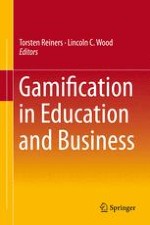2015 | OriginalPaper | Buchkapitel
19. Gamification in Virtual Worlds for Learning: A Case Study of PIERSiM for Business Education
verfasst von : David Craven, M.B.A., B.Bus., B.A., Dip.Teach.
Erschienen in: Gamification in Education and Business
Aktivieren Sie unsere intelligente Suche, um passende Fachinhalte oder Patente zu finden.
Wählen Sie Textabschnitte aus um mit Künstlicher Intelligenz passenden Patente zu finden. powered by
Markieren Sie Textabschnitte, um KI-gestützt weitere passende Inhalte zu finden. powered by
